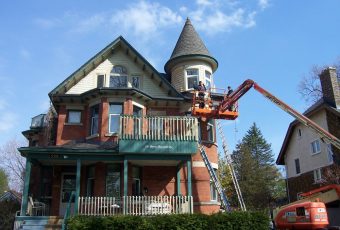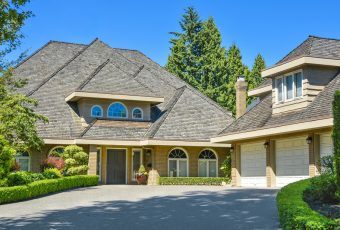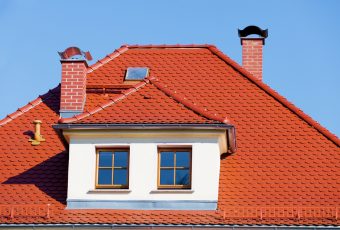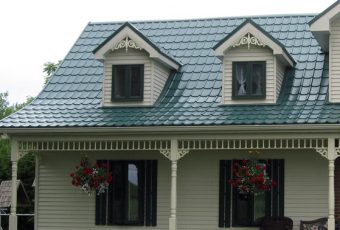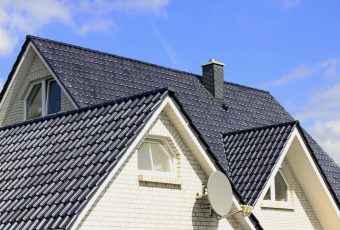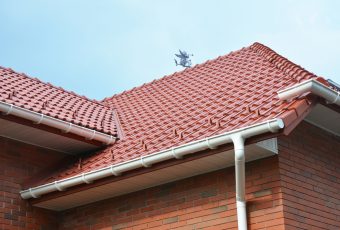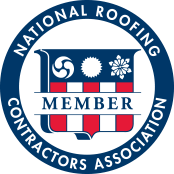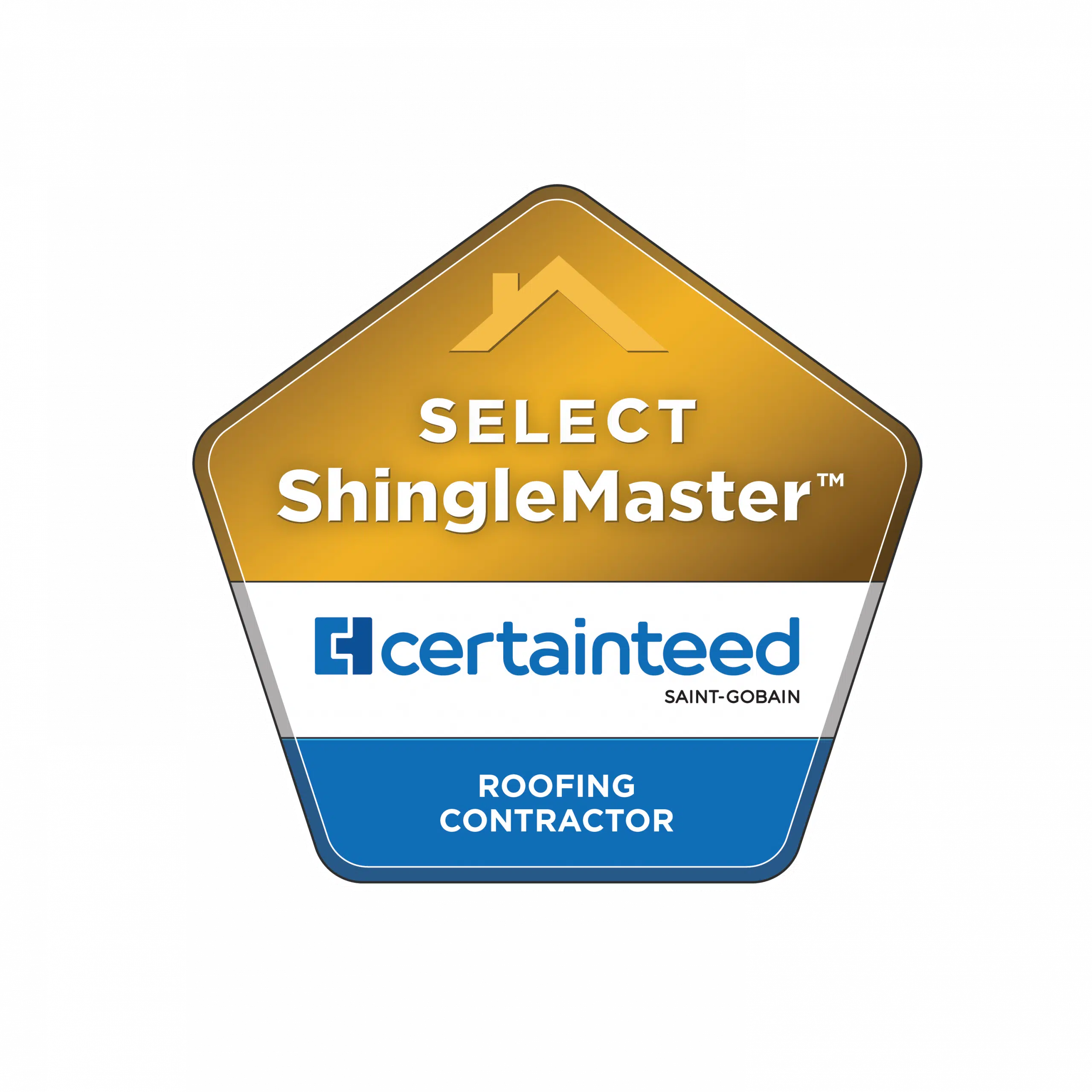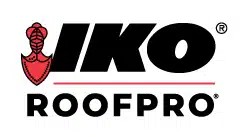Shingle Roofing
Here at Roofmaster, we have specialized in roofing, roof shingle installations, and maintenance in Ottawa for over 40 years! Over these four decades, we have gathered what we believe to be the most important knowledge to help you choose the best roof shingles for your Ottawa home. Get your quote today!
What are Sloped Roofs?
A sloped roof, or pitched roof, differs from flat roofing by featuring an angled or inclined surface. There are many different types of sloped roofs, all with their own aesthetic appeal. These include the common hipped and gabled roofs, known for their popularity in residential areas, particularly for homes.
Benefits of Sloped Roofs
Depending on your building’s design, sloped roofs are generally a great choice both from an aesthetic and architectural standpoint, providing adequate protection from weather while being compatible with many different types of shingles.
Sloped roofs also offer a few more practical benefits than flat roofs. However, if you are constructing a building, whether a home or commercial space, it’s important to talk about the pros of various roofing pitches with your architect or contractor before making a decision. Here are some of the other key advantages of opting for a sloped roof:
- Improved Ventilation: Sloped roofs promote better ventilation, which can significantly improve a building’s energy efficiency, helping to regulate indoor temperatures and reduce heating and cooling costs.
- Ease of Installing Installation: The structure of sloped roofs allows for easier insulation installation, which is important for maintaining comfortable indoor temperatures during Ottawa winters.
- Improved Stability in Wet Weather: Sloped roofs are inherently more stable and efficient at managing heavy rain and snowfall, preventing water accumulation and the potential for structural damage.
- Better Drainage: Unlike flat roofs, sloped roofs offer improved drainage, reducing the risk of water damage by directing rainwater into gutters for efficient disposal or collection for reuse.
- Cost-Effective: Generally, sloped roofs are cheaper and simpler to repair and maintain.
- Additional Storage Space: Many sloped roof designs afford extra space that can be used for storage or converted into additional living areas.
- Solar Panel Usage: The angled surface of a sloped roof is ideally suited for solar panel installation, enabling building owners to take advantage of renewable energy capture.
ASPHALT SHINGLES
Asphalt shingles are the most common type of roofing material in North America for residential applications. Despite some history of problems and the traditional complaints, such as curling, clawing, cracking, de-granulating, wind damage, deteriorating curb appeal over the roof’s life and a short life generally, asphalt shingles remain the most popular form of roofing.
The reasons are clear. First, asphalt shingles are still the cheapest to purchase and install, making them the cheapest roofing system on a per-year basis. Second, improvements in asphalt shingle manufacturing technology and material over the past 2 decades have led to fewer of the traditional problems associated with asphalt shingles. Third, the warranties and life expectancy have dramatically improved over the same timeframe, such that you can now buy 40-year or 50-year or “Lifetime” warranty asphalt shingles relatively cheaply and have them installed for less money than the cheapest form of 40-year warranty metal roof.
The downside remains that the roof’s appearance deteriorates even while the roof is still good enough to hold out water from the building. Additionally, most asphalt shingles and associated products end up in landfills despite decades of talk about being able to recycle the components.
SHAKES & TILES
Much less seen these days in the Ottawa area are the various natural products (wood, stone and thatch) that used to go on roofs back in the day, but which are still common in some markets around the world.
Wood shakes and shingles are still popular in the Western provinces or states like British Columbia. Wood shingles, both pine and cedar, generally refer to a sawn product that produces a uniform thickness, if not width. Wood shakes, on the other hand, generally refer to hand-split products, such that the natural grain of the wood maintains integrity. Shakes split in this way are usually longer lasting than sawn shingles which inevitably have to slice through the grain. In Eastern Canada, we mostly see cedar shingles made of eastern white cedar, which is the poor cousin of the magnificent western red cedar. Western red cedar products will outshine eastern white cedar or pine products in terms of size, look and longevity (having about double the lifespan), but of course, they are significantly more expensive as well. Generally, wood shingles and shakes are 2-3 times more expensive than asphalt shingle roofs.
Slate roofing tiles are obviously a natural stone product, with possibly one of the longest life expectancies at over 100 years (zinc roof tiles also boast such life expectancies.) Slate, once used on high-end homes as well as institutional buildings, can still be seen occasionally in the downtown core of many cities. It remains very popular in Europe, but is seen much less in North America, despite the existence of quarries producing some amazingly beautiful slate tiles. The downside of slate is simply the high cost of the product, plus extremely labour-intensive work (a skill that is also now hard to find locally). Overall a slate roof may cost 8-10 times that of a standard asphalt shingle roof.
Synthetic slate tiles are now slowly taking over the tiny slate tile market. Different versions of imitation slate are available, made of vinyl or recycled rubber and plastics. The products are typically lightweight and come with 50-year warranties and 100-year life expectancies. There are also metal tiles that simulate slate tile shapes (but cannot imitate the colouration or texture). Definitely less expensive than installing real slate, at perhaps 3 times the cost of standard asphalt shingles.
Clay tile roofs, though very common in southern climates, are not prevalent in Canada. Before deciding on clay, concrete or slate tiles, a homeowner should check with an engineer about whether the roof structure can support such weights. Standard home construction roof trusses usually can’t handle the weight of clay tiles, and the trusses will have to be reinforced. Get ready to spend the big bucks, as these alterations and tile systems are not cheap. Some companies specialize in a composite concrete tile that is meant to resemble clay tiles. Roofmaster does not install real clay tiles or composite clay tiles but does install several versions of steel tiles that imitate the original clay tile appearance.

